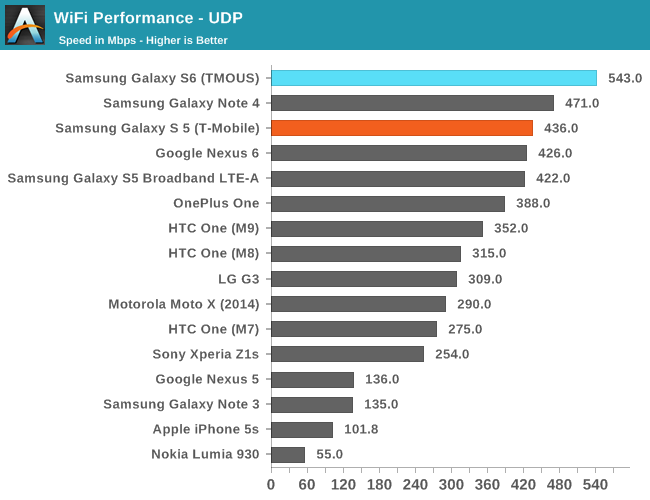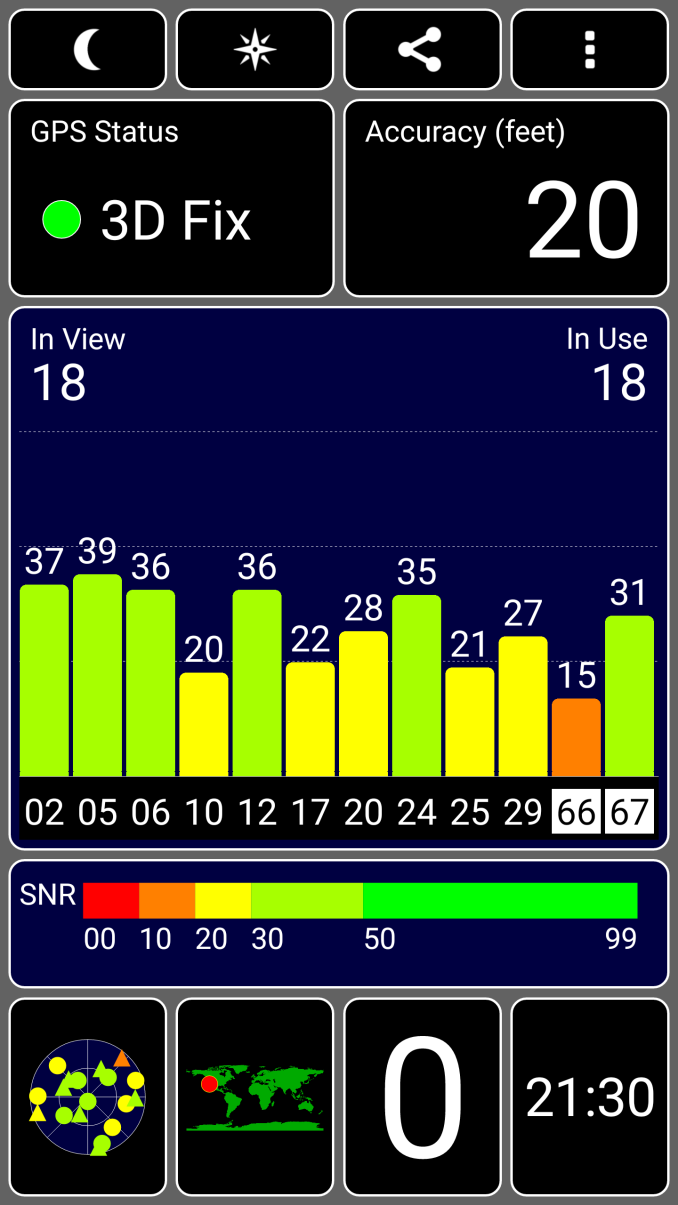The Samsung Galaxy S6 and S6 edge Review
by Joshua Ho on April 17, 2015 9:00 AM EST- Posted in
- Smartphones
- Samsung
- Mobile
- Galaxy S6
- Galaxy S6 Edge
WiFi Performance
As WiFi is still quite important on a smartphone for anyone on a relatively limited data plan, it's also important to test how well a device behaves when using WiFi. In order to do this, we use our standard iperf test to see how fast the device can send UDP packets. In the case of the Galaxy S6, we see that it shares the same BCM4358 WiFi/Bluetooth combo chipset that we first saw in the Galaxy Note 4. As always, in order to ensure maximum possible performance we're using an Asus RT-AC68U router to avoid issues with the router bottlenecking the phone.

As we can see, the Galaxy S6 manages to do better than anything else we've been able to test in recent memory. I'm not sure what's causing the difference in performance when comparing against the Note 4, but it's definitely possible that the antenna configuration has been improved to increase coherence and therefore the performance benefit that comes from MIMO.
GNSS Performance
In most of the Galaxy S6 variants, as there is no Gobi modem that could be used to provide GNSS location services it seems that Samsung has turned to Broadcom to provide satellite location services. In the case of the Galaxy S6, we see a Broadcom BCM4773 location chipset. This includes support for all of the major constellations including GPS, Beidou, and GLONASS in addition to SBAS, which helps to improve accuracy beyond what conventional GPS satellites can provide. To get a good idea for how good this system is I tried testing how long it took for a lock to happen on a clear night with airplane mode on. The Galaxy S6 managed to acquire a lock in 20 seconds which is likely to be a warm lock but a cold lock will likely take a minute without assistance data. After an additional 20 seconds I saw a peak accuracy of 20 feet, so there shouldn't be any notable issues with the GPS system. For the Galaxy S6 CDMA variants it's likely that location will be done using the MDM9x35 Gobi modem rather than the Broadcom solution used in the GSM Galaxy S6.
Misc
For the Galaxy S6, Samsung has fundamentally uprooted how they traditionally design their phones, and in the case of the entire radio architecture this is especially true. Instead of the standard Qualcomm modem, we see that Samsung has moved to the Shannon 333 GSM/LTE modem for the Galaxy S6 GSM variants. Given that this is likely to be the same modem that is in the Note 4 LTE-A it’s likely that this modem will ship as category 6, while we have reason to believe it's ultimately capable of UE category 9. However, whether the RF front-end is capable of handling 3x carrier aggregation of up to 450 Mbps on the downlink is a different question and is likely to be one that we won’t know the answer to unless support is added in an OTA update.
The transceiver, envelope tracker, antenna tuner, and most of the components that would traditionally be Qualcomm parts in a Snapdragon-equipped phone have also been replaced with Samsung Shannon components based upon the Chipworks teardown. In general though, I didn’t notice any issues with this choice of RF components although judging by the use of Qualcomm modems in the CDMA variants it’s likely that such a move was necessary in order to ensure good RF performance on CDMA networks but not GSM networks due to Qualcomm’s experience with CDMA2000. It's likely that anyone that has had previous experience with the CDMA Galaxy Nexus would be able to attest to this.
Unlike some other variants, we’ve noticed that the Galaxy S6 T-Mobile variant uses an Audience eS804 voice processor to enable hot word detection and S-Voice launching and is likely also active in phone calls and in any other scenario where noise cancellation and voice processing would be beneficial. The T-Mobile variant that we received also uses an NXP PN547 NFC module rather than a Samsung NFC module, but we did confirm that there is an ST-M digitizer used for the touchscreen and a Cypress CapSense PSoC for the capacitive keys.
Although I still don’t have the equipment to test speakers properly, subjectively the audio quality of the Galaxy S6’s single downward-firing speaker is good. The volume gets high enough that I never really used it on maximum volume for videos, but it’s still annoying to have to cup my hand to ensure that sound is going towards my face rather than traveling away. Overall the M9 still has much better speakers for a good media experience, but there’s nothing wrong with the speaker on the Galaxy S6 for casual use. I definitely found myself using it less than the front-facing speakers on the M9 though.











306 Comments
View All Comments
hlovatt - Saturday, April 18, 2015 - link
Firstly, great review. Love all the detail and care taken in obtaining the results.I am glad to see the changes Samsung have made. The S4 and S5 were really oh hum phones, not deserving the flagship monicker. This time they have produced something that will challenge Apple, HTC, etc.
melgross - Saturday, April 18, 2015 - link
$45 isn't all that much. You would save $15 by doing it yourself. So you will need tools to pry the case apart after you've softened the glue using a hairdryer. How do you intend to put it back together?xenol - Friday, April 17, 2015 - link
I just don't find myself needing an SD card slot, if only because I don't really fill my phone up anyway. I'm really wondering what other people fill their phones up with in order to need an SD card slot. I was under the impression that music is just lifted off internet radios and videos from YouTube or some other service (and if they want to watch a lengthy movie, they'll add it in when they want to).I don't know, maybe I'm just the kind of person who doesn't mind managing data and don't have a lot to begin with on the phone.
esterhasz - Friday, April 17, 2015 - link
I have a lot of music on my phone and videos for the kid. Having to pay such a premium for a 64gb version is hard to swallow when sd cards are really cheap.SkyBill40 - Friday, April 17, 2015 - link
Agreed. Like you, I've got a lot of music on my phone and it's all on an SD card.I'm upgrade eligible at any time from my Note 3 but am seeing how long I can or am willing to hold off for the next round of releases. If the Note 5 isn't a substantial improvement over the 3/4 or whatever, I'll likely jump to another vendor that has the right mix of things I'm after. It'll either be another Android phone or *maybe* Windows. No way in hell will I ever jump to Apple.
RiotSloth - Thursday, May 14, 2015 - link
In the UK it's about the price of a point of beer a month to go from 32 to 64 gig. Well worth it for me.JeffFlanagan - Friday, April 17, 2015 - link
I used to need 128GB to load TV and movies onto my phone, but yes, now I can stream video from home via Plex, in addition to watching NetFlix, so the internal 64GB is plenty. There will be a 128GB version for people who need more space. We no longer have to take a performance hit to get 128GB via SD card.will54 - Monday, April 20, 2015 - link
I love my lossless Flac and WMA audio which takes up about 5-7X more space than an mp3 so I need my 32+128 GB's. The quality is worth the extra space imo.RiotSloth - Thursday, May 14, 2015 - link
Have you ever tried a double blind test between high and regular versions on your phone? Genuine question, I'm curious.andyasia - Friday, April 17, 2015 - link
I could Bluetooth my data to my laptop as backup, or swap data time to time as I like, so no problem there. ☺